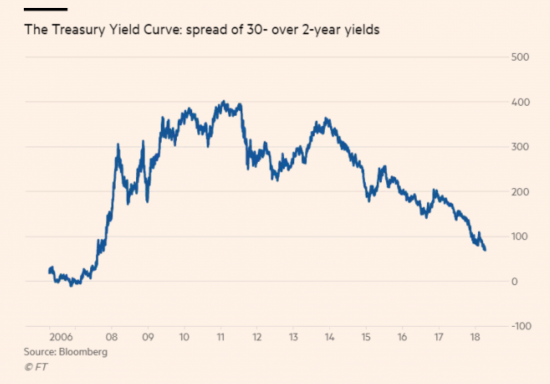There is a fascinating chart in the FT, from John Auher:
As he notes:
The yield curve [that shows the difference between expectations on long and short-term interest rates], is sending a clear message, however. The fear of a Fed mistake is increasing. The spread of 10-year over 2-year Treasury yields is almost back to a post-crisis low, while the spread of 30- over 2-year yields is indeed now at a post-crisis low: If expectations for interest rate rises for the next two years are growing, but not expectations for longer rates, the implication is that the market thinks that the Fed will indeed deliver rate rises, and go too far – leading to slower growth, and therefore lower yields thereafter.
I agree with him. The inflation that there is in the world rate now is short-term volatility that will work its way through the system without intervention. There is no inflation in sight that requires any central bank or fiscal policy action. Consumers simply aren't buying. In that case inflation cannot persist. But central bankers won't resist intervening. And in the process they can only make things worse.
Inflation is not the issue in today's economies. The failure of demand in the face of global and local crises from Syria to Brexit, as well as the destruction of economic certainty for many households because of market liberalisation, is what really requires attention. Pretending that the old concern of inflation is what matters now is like playing the fiddle as the ship sinks. But I expect the Fed and the BoE to be playing a duet on this, nonetheless.
Thanks for reading this post.
You can share this post on social media of your choice by clicking these icons:
You can subscribe to this blog's daily email here.
And if you would like to support this blog you can, here:




Might be worth reviewing how UK SME lending has fallen dramatically since 2012, due to loss of trust in banks – the interest rate swap curse is a major contributor. I will expand on this in @smoothregulator tweets.
Please send the data
Write a blog if you want
Peter Crowley says:
“Might be worth reviewing how UK SME lending has fallen dramatically since 2012, due to loss of trust in banks ….”
An interesting presentation the other evening by Michelle Thompson and Roger Mullin was saying something very similar. Their graph shows bank lending in the first two months of this year as being a negative quantity. Quite a large negative quantity.
(I’m struggling for data at present because my computer is on the blink (possibly dead) so have only restricted public library access.)
God lick with the computer
“God lick with the computer”. Sounds like English policeman in Alo Alo.
🙂
God has licked my computer. 🙂
Yay!
1 why do we speak of ‘inflation’ (which focuses on prices) and not ‘devaluation’ which I think more accurately reflects the fact that part of people’s earnings are taken from them for nothing.
2 Does any measure the hidden (from economists) inflation we see as peoples living cost increase when they have to fund privately what used to be state and local authority provision?
Frank
Sorry 2 shd read ‘Does anything measure ..’
Frank
I am not sure you can glean Inflationary expectations from financial markets. The most rational observation is the cross over point between conventional and index linked gilts. This currently states 5yr RPI at 2.97% and 10yr at 3.16%.
BoE’s key indicator is expectations for 5y inflation, 5years forward. “5y5y fwd” in the trade, currently stands at 3.35%.
Utterly inconsequential then
I would say so but of more consequence than the “fascinating” chart shown in the FT. Gilts remain distorted by QE and the insatiable demand to hedge vs inflation from long term liability outfits ie defined benefit pension funds.
Jason says:
“I would say so but of more consequence than the “fascinating” chart shown in the FT. ” Or perhaps just equally inconsequential ?
“Gilts remain distorted by QE and the insatiable demand to hedge vs inflation from long term liability outfits ie defined benefit pension funds.”
It’s surely not just gilts that are that are skewed by QE. The entire assets market is in fairyland.
You should talk more about the ‘market liberalisaion’ to which you attribute economic uncertainty.
Many people wouldn’t even know what it means and that includes BBC journalists that I have spoken to.
People need to understand it (its not that complicated) because it is the basis of how our economy now runs.
It is the reason we don’t own anything in the UK any more, and why foreign buyers, having acquired UK firms can then shift them to cheaper labour countries – once they have hoovered up whatever government support is available in the name of maintaining jobs.
JLR?
And when privatised aspects of public services being liberalised, it makes it a helluva lot harder to reverse the privatisations if transnational firms are involved.
And much more so if these are committed to international trade agreements.
The whole basis of the WTO and the trade deals agenda is ‘liberalisation’.
But where is it explained?
I agree with you
WTO rules are worse than those of the EU